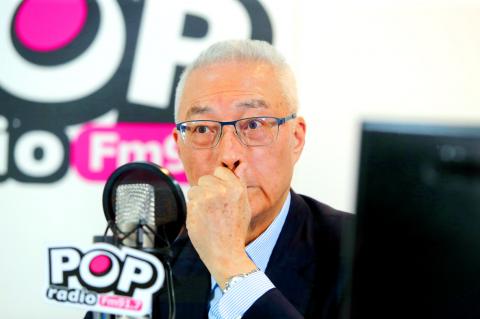Chinese Nationalist Party (KMT) Chairman Wu Den-yih (吳敦義) yesterday suggested that the party could “recruit” Kaohsiung Mayor Han Kuo-yu (韓國瑜) to join the party’s presidential primary.
The party’s plan to recruit Han would be a “fair” mechanism without hurting the party or Han, Wu said in a radio interview, but added that it would not do so if Han clearly refuses to join.
Asked how the party would decide on its nominee among many candidates, he said that the KMT prefers to conduct public opinion polls, instead of just among its members.

Photo: CNA
KMT headquarters on Wednesday granted a membership certificate to Hon Hai Precision Industry Co (鴻海集團) chairman Terry Gou (郭台銘) for lending the party NT$45 million (US$1.46 million at the current exchange rate) in 2016 without interest, Wu said, negating allegations that the move was aimed at helping Gou resolve his questionable membership so that he could take part in the primary.
After Gou received the certificate on Wednesday, he announced that he would participate in the party’s primary, saying that he would not accept being drafted to run.
He said that if he wins, he would stand as the KMT’s presidential candidate, and that if he loses, he would support whoever is selected.
Gou did not inform the party before announcing his decision to join the primary, Wu said yesterday, denying rumors that he and former president Ma Ying-jeou (馬英九) plotted for Gou’s participation to hinder Han.
Wu reaffirmed his objectivity, saying that he has decided not to contest the primary and that he would meet with Han, Gou and the other hopefuls — former New Taipei City mayor Eric Chu (朱立倫), KMT Legislator Wang Jin-pyng (王金平) and former Taipei County commissioner Chou Hsi-wei (周錫瑋) — to discuss the primary’s rules.
Referring to Wu’s remarks on recruiting Han, Chu said that the party’s primary plan “has changed from a romance film to an action movie to a science-fiction movie.”
He urged KMT headquarters to “provide a clear mechanism for the primary” to avoid losing supporters.
Wang also demanded a clearly defined primary mechanism, saying that it would allow candidates to feel secure in launching election campaigns.
Despite playing a role in helping Han win the mayoral election in November last year, Wang said that he would respect Han’s decision if he decides to enter the primary.
Gou yesterday said on Facebook that he anticipates a fair, just and open competition for the party’s nomination, adding that he would prove himself the best candidate during the primary.
Meanwhile, Han said that as mayor, his priority is to care about Kaohsiung’s residents and boost its economic development.
Additional reporting by Lin Hsin-han, Huang Chia-lin, Wang Jung-hsiang and Cho Yi-chun

Tropical Storm Gaemi strengthened into a typhoon at 2pm yesterday, and could make landfall in Yilan County tomorrow, the Central Weather Administration (CWA) said yesterday. The agency was scheduled to issue a sea warning at 11:30pm yesterday, and could issue a land warning later today. Gaemi was moving north-northwest at 4kph, carrying maximum sustained winds near its center of up to 118.8kph and gusts of 154.8kph. The circumference is forecast to reach eastern Taiwan tomorrow morning, with the center making landfall in Yilan County later that night before departing from the north coast, CWA weather forecaster Kuan Shin-ping (官欣平) said yesterday. Uncertainty remains and

SEA WARNING LIKELY: The storm, named Gaemi, could become a moderate typhoon on Wednesday or Thursday, with the Taipei City Government preparing for flooding A tropical depression east of the Philippines developed into a tropical storm named Gaemi at 2pm yesterday, and was moving toward eastern Taiwan, the Central Weather Administration (CWA) said. Gaemi could begin to affect Taiwan proper on Tuesday, lasting until Friday, and could develop into a moderate typhoon on Wednesday or Thursday, it said. A sea warning for Gaemi could be issued as early as Tuesday morning, it added. Gaemi, the third tropical storm in the Pacific Ocean this typhoon season, is projected to begin moving northwest today, and be closest to Taiwan on Wednesday or Thursday, the agency said. Today, there would likely

DISRUPTIONS: The high-speed rail is to operate as normal, while several airlines either canceled flights or announced early departures or late arrivals Schools and offices in 15 cities and counties are to be closed today due to Typhoon Gaemi, local governments announced last night. The 15 are: Taipei, New Taipei City, Taoyuan, Tainan, Keelung, Hsinchu and Kaohsiung, as well as Yilan, Hualien, Hsinchu, Miaoli, Chiayi, Pingtung, Penghu and Lienchiang counties. People should brace for torrential rainfall brought by the storm, with its center forecast to make landfall on the east coast between tonight and tomorrow morning, the Central Weather Administration (CWA) said. The agency issued a sea warning for the typhoon at 11:30pm on Monday, followed by a land warning at 11:30am yesterday. As of

CASUALTY: A 70-year-old woman was killed by a falling tree in Kaohsiung as the premier warned all government agencies to remain on high alert for the next 24 hours Schools and offices nationwide are to be closed for a second day today as Typhoon Gaemi crosses over the nation, bringing torrential rain and whipping winds. Gaemi was forecast to make landfall late last night. From Tuesday night, its outer band brought substantial rainfall and strong winds to the nation. As of 6:15pm last night, the typhoon’s center was 20km southeast of Hualien County, Central Weather Administration (CWA) data showed. It was moving at 19kph and had a radius of 250km. As of 3pm yesterday, one woman had died, while 58 people were injured, the Central Emergency Operation Center said. The 70-year-old